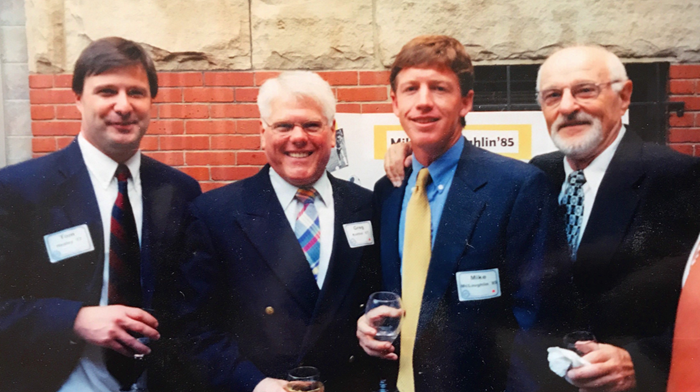
(L to R: Tom Healey '77, "Doc" Greg Knittel '67, Mike McLaughlin '85, Attila Farkas)
The world of entertainment, including – and maybe especially – sports, has sucked all the meaning out of speaking in superlatives. Everyone is the best, the most talented, world-class, and – my favorite – truly unique. I’m old enough to remember when unique meant “one of a kind,” but now that seems not to be good enough and those who are the best, most talented and world-class are deemed “truly unique” and therefore really one of a kind.
Anyone who ever met and spent even a brief period of time with Attila Farkas would be hard-pressed to find a better phrase than “truly unique” to describe that mad Hungarian pastry chef and soccer coach. On the morning of the Mass of the Holy Spirit we got word that Attila had passed away at the age of 83. It was a tribute to the man so beloved by all in the Saint Ignatius soccer community that our sadness was overshadowed by our fond recollections of a personality that filled the locker room and a heart that bled blue and gold.
I first met Attila in the late spring of 1984. I was the new junior varsity soccer coach and so head coach and founder of the soccer program the late Dr. Greg Knittel ’67 wanted me to meet with him and his assistant Coach Farkas to talk about plans for the upcoming season. Attila was reservedly polite and a bit wary of my inclusion in the coaching staff until I told him that my maternal grandmother was a Farkas. His eyes lit up and he told me to call him Attila bácsi – Uncle Attila in Hungarian. The fact that my knowledge came from being a fan rather than a former player no longer mattered to him. He would take it upon himself to teach me everything he knew – and that knowledge was immense – about the game that he loved so much.
Soccer was in his veins, having grown up in Budapest during the greatest period in the history of Hungarian soccer. Attila would regale us with stories of his boyhood heroes from the early 1950s: the Golden Team, also known by several adulatory monikers that began with M – Mighty, Marvelous, Magnificent, Magical – and followed by the word Magyars. For Attila, players like Pele, Cruyff and Maradona paled in comparison to the one and only Ferenc Puskás, the leader of the team whose skill and flair captured the hearts of soccer fans around the world.
To listen to Attila talk about soccer – whether recounting stories of the legends of his youth, or describing one of our players as a builder or a destroyer, a ballerina or a boxer – was thoroughly entertaining, especially when heard through his melodic Hungarian accent and spicy sentence enhancers. Despite being a man whose incisive yet scatological halftime talks could peel the paint off of locker room walls, those who knew him well were privy to Attila’s artistic and refined side – after all, while growing up in Hungary he had the benefit of both a piano instructor and a French tutor.
Attila and I would ride together in the school van, travelling to games or to daily practice at our home field at Brookside Park. He would insist on riding shotgun as I drove, mostly because he needed both hands to talk to the players in the back, but also because he wanted to control the radio. For him there was only one station: WCLV, Cleveland’s classical music channel. He wanted to bring a little bit of the Old World to these very New World high school soccer players riding in the van with us. Frustrated that his animated instruction in high culture fell on deaf ears he would often look at me and with raised eyebrows and a shrug of his shoulders exclaim, “Sacre bleu.”
Yet in one area he was very successful in bringing the Old World to his players (and to his fellow coaches) and that was as a pastry chef. His media may have been dough and cream and fruits and nuts, but Attila’s creations were as symphonic as anything produced by his countrymen Franz Liszt and Béla Bartók. To have tasted his delicacies is to understand his complete and utter disgust at being called a baker. Thoroughly insulted, he would rhetorically ask, “Do you see any @#$%^&* bread? Do you see any *&^%$#@ donuts?” And yet a minute later, with a smile that could warm the coldest heart, he would offer a Napoleon or a slice of Dobos torte to ensure that the admonished heretic would become a convert and true believer.
And that was the Attila that we all knew – a man of great intensity and a man of great kindness. This intense and kind man was for me and for so many others in the Saint Ignatius soccer family a mentor and a friend, someone who taught us about soccer and so much more. Ask any one of us to describe Coach Farkas in two words and it’s a guarantee that you will hear a constant refrain of “Truly unique.”
May you rest in peace, Attila bácsi.
A.M.D.G.